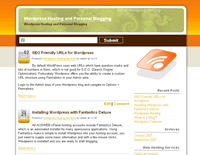What is a Blog?
“Blog” is an abbreviated version of “weblog”, which is a term used to describe web sites that maintain an ongoing chronicle of information. A blog is a frequently updated, personal website featuring diary-type commentary and links to articles on other Web sites. Blogs range from the personal to the political, and can focus on one narrow subject or a whole range of subjects. 
To view our WordPress demo site with a custom theme installed, please click on the thumbnail to the right.
Many blogs focus on a particular topic, such as web design, home staging, sports, or mobile technology. Some are more eclectic, presenting links to all types of other sites. And others are more like personal journals, presenting the author’s daily life and thoughts.
Generally speaking (although there are exceptions), blogs tend to have a few things in common:
- A main content area with articles listed chronologically, newest on top. Often, the articles are organized into categories.
- An archive of older articles.
- A way for people to leave comments about the articles.
- A list of links to other related sites, sometimes called a “blogroll”.
- One or more “feeds” like RSS, Atom or RDF files.
Some blogs may have additional features beyond these.
The Blog Content
Content is the main reason for any web site. Retail sites feature a catalogue of products. University sites contain information about their campuses, curriculum, and faculty. News sites show the latest news stories. For a personal blog, you might have a bunch of observations, or reviews. Without some sort of updated content, there is little reason to visit a web site more than once.
On a blog, the content consists of articles (also sometimes called “posts” or “entries”) that the author(s) writes. Yes, some blogs have multiple authors, each writing his/her own articles. Typically, blog authors compose their articles in a web-based interface, built into the blogging system itself. Some blogging systems also support the ability to use stand-alone “weblog client” software, which allows authors to write articles offline and upload them at a later time.
Comments
Want an interactive website? Wouldn’t it be nice if the readers of a website could leave comments, tips or impressions about the site or a specific article? With blogs, they can! Posting comments is one of the most exciting features of blogs.
Most blogs have a method to allow visitors to leave comments. There are also nifty ways for authors of other blogs to leave comments without even visiting the blog! Called “pingbacks” or “trackbacks”, they can inform other bloggers whenever they cite an article from another site in their own articles. All this ensures that online conversations can be maintained painlessly among various site users and websites.
The Difference Between a Blog and a CMS
Software that provides a method of managing your website is commonly called a CMS or “Content Management System”. Many blogging software programs are considered a specific type of CMS. They provide the features required to create and maintain a blog, and can make publishing on the Internet as simple as writing an article, giving it a title, and organizing it under (one or more) categories. While some CMS programs offer vast and sophisticated features, a basic blogging tool provides an interface where you can work in an easy and, to some degree, intuitive manner while it handles the logistics involved in making your composition presentable and publicly available. In other words, you get to focus on what you want to write, and the blogging tool takes care of the rest of the site management.
WordPress is one such advanced blogging tool and it provides a rich set of features. Through its Administration Panels, you can set options for the behaviour and presentation of your weblog. Via these Administration Panels, you can easily compose a blog post, push a button, and be published on the Internet, instantly! WordPress goes to great pains to see that your blog posts look good, the text looks beautiful, and the html code it generates conforms to web standards.
WordPress is the perfect Content Management System for all your blog publishing and website management needs with one of WEB24’s cPanel Hosting plans.

